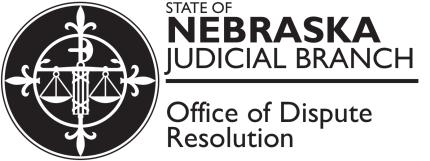Mediation & Restorative Justice
What is Mediation?
When you are having a difficult time with someone else, it can be very stressful. It can also be hard to ask for help. As hard as it may be, sometimes help is needed, and mediation may be the answer.
Mediation is a process that helps you and others work through disagreements. This is done with the help of a mediator. A mediator is someone with skills to help you and others work through a problem to see if you can create an agreement that works for you. You are the one that decides if an agreement works for you. The mediator does not make decisions on the agreement.
Mediation can be used for:
- Parenting plans to address custody and parenting time
- Education issues related to special education
- Employment and organizational disputes
- Consumer - business disputes
- Tenant - landlord disputes
- Neighbor and community disputes
- Environmental issues
To ensure that all Nebraskans have access to mediation, the Office of Dispute Resolution (ODR) approves mediation centers that can help you with a variety of issues. ODR also approves mediators that help parents create or modify parenting plans. More information on approved centers and mediators is available on the "Find a Mediator" page.
What is Restorative Justice?
Restorative justice (RJ) deals with offenses differently by involving those impacted by what happened. Through RJ, the person who committed the offense must take responsibility for their actions and address the needs of those impacted by the offense. Another important focus is on victim safety. The victim decides if they want to participate and at what level. If a victim does not want to participate, there is an option to use a surrogate. A surrogate is someone who has experienced something similar and can share their perspective. Surrogates do not speak for the victim.
There are different RJ processes though they all focus on relationships and engagement. RJ gives a voice to all involved. Everyone involved talks through what happened, what the impacts were, and what needs to happen to make things right. When the person that committed the offense is part of creating the solution, there is a better chance of that person being successful. Success is following through with what was agreed to.
The Office of Dispute Resolution (ODR)
The ODR is an administrative office created by the Dispute Resolution Act. The ODR promotes mediation and RJ in the courts and in our families and communities. To accomplish this, the Act created a system of nonprofit mediation centers to provide services and the Dispute Resolution Advisory Council to oversee the activities of the ODR.
Information for Judges and Court Staff
Mediation will not solve all problems of the courts, but when appropriate and used effectively, mediation can have many benefits. To name a few:
- Mediation is private, not intimidating, and has a higher percentage of self-enforcing agreements
- Parties tend to be more satisfied with alternative dispute resolution (ADR) processes
- Mediation can resolve past issues and addresses future needs
Mediation is best when there is a long-term relationship involved (e.g., family members, landlord/tenant, parent/child/school, etc.). Parties should also have a desire to work through the problem and can safely communicate on some level. In cases when it is important to set legal guidance or there is a need for public sanctioning of conduct, mediation may not be appropriate.
Potential Case Types:
- Small claims mediation
- Child welfare collaborative practices, including:
- Prehearing conference facilitation (PHC) at initial removal hearings
- Prehearing facilitation of 12-month permanency reviews (PHPR)
- Prehearing facilitation of termination of parental rights hearings (PHTPR)
- Family group conferencing
- Child dependency mediation
- Guardian and conservator mediation
- Probate mediation
- Juvenile victim/offender and restorative justice
- Dissolution and custody disputes
A copy of the court is provided to the mediation center when the judge refers the case for mediation. Often, deadlines are set but additional time can be granted if it assists with the resolution.
More detailed information may be found by reading the ADR Handbook: Mediation and Restorative Justice Practices For Judges and Court Staff.
Contacts:
Nicole Britten, Program Specialist
402.416.0670
nicole.britten@nejudicial.gov
Kelly Riley, M.P.A., Director
402.419.9650
kelly.riley@nejudicial.gov
Nebraska Office of Dispute Resolution
Administrative Office of the Courts and Probation
Mailing Address: PO Box 98910, Lincoln NE 68509-8910
Office Address: 521 S 14th St., Suite 102, Lincoln NE 68508
nsc.mediation@nejudicial.gov


